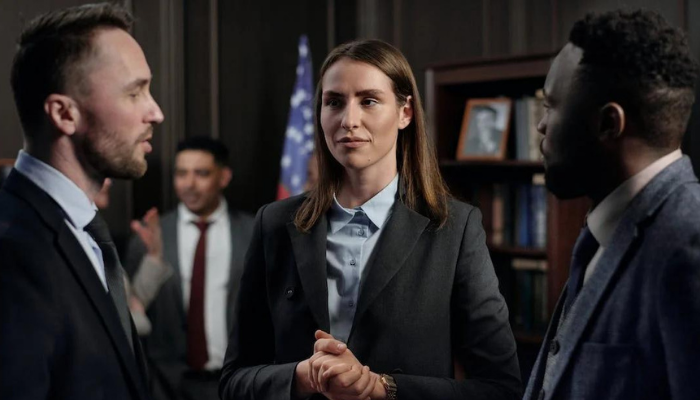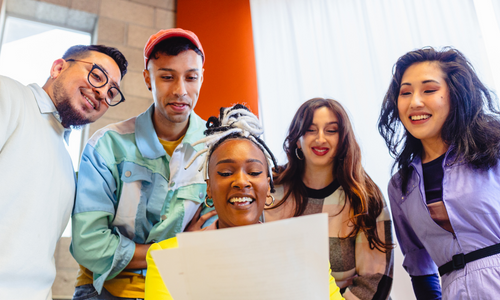Diplomats, also known as the Counselors in the MBTI (Myers-Briggs Type Indicator) personality assessment, are individuals with a preference for introversion, intuition, feeling, and perceiving.
These preferences can influence their communication style in the following ways:
Emotional and empathetic: Diplomats tend to be emotional and empathetic in their communication, and they may be skilled at understanding and expressing their own emotions as well as the emotions of others.
Warm and engaging: These individuals may be warm and engaging in their communication, and they may be skilled at building rapport and developing relationships with others.
Sensitive to others’ feelings: Diplomats tend to be sensitive to the feelings of others, and they may struggle with conflict or confrontation in communication.
May have difficulty expressing their own needs and wants: Because they are focused on the needs and feelings of others, Diplomats may struggle with expressing their own needs and wants, and they may find it difficult to advocate for themselves.
May struggle with making decisions: These individuals may struggle with making decisions, as they tend to weigh all options and consider the impact on others before making a choice.
May struggle with assertiveness: Diplomats may struggle with assertiveness and may find it difficult to express their opinions or ideas if they conflict with those of others.

Here are some additional points to consider when discussing the communication style of Diplomats in the MBTI assessment:
Focus on understanding: Diplomats tend to be focused on understanding the thoughts and feelings of others, and they may be skilled at interpreting nonverbal cues and body language.
Good at listening: These individuals may be good listeners, and they may be skilled at showing empathy and support to others through their words and actions.
May be more reserved in communication: Because they prefer introversion, Diplomats may be more reserved in communication, and they may need time to think and process their thoughts before speaking.
May struggle with public speaking: These individuals may struggle with public speaking or presenting in front of large groups, as they may feel nervous or self-conscious.
May be more indirect in communication: Diplomats may be more indirect in their communication style, and they may prefer to communicate through subtle cues or body language rather than being direct and straightforward.
May be more sensitive to criticism: Because they tend to be emotionally sensitive, Diplomats may be more sensitive to criticism or negative feedback, and they may need time to process and cope with these emotions.
May be more collaborative in communication: Diplomats tend to value harmony and cooperation, and they may be more collaborative in their communication style, seeking the input and feedback of others before making decisions.
Overall, individuals with a Diplomat communication style tend to be emotional, empathetic, warm, and engaging. However, they may struggle with expressing their own needs and wants, making decisions, and assertiveness.
Despite this, their sensitivity and understanding of the emotions of others can be highly effective in building rapport and developing relationships.
Table of Contents
- 1 Diplomats Advocate (INFJ-A/INTJ-T)
- 2 Mediator (INFP-A/INFP-T)
- 3 Protagonist (ENFJ-A/ENFJ-T)
- 4 Campaigner (ENFP-A/ENFP-T)
- 5 ADVANTAGES OF DIPLOMATS IN COMMUNICATION ISSUES
- 6 10 DISADVANTAGES OF DIPLOMATS IN COMMUNICATION ISSUES
- 7 30 QUESTIONS TO ASK TO DIPLOMATS ABOUT COMMUNICATION
- 8 20 GENERAL TIPS FOR DIPLOMATS FOR COMMUNICATION
Diplomats Advocate (INFJ-A/INTJ-T)
Advocates, also known as the Counselors in the MBTI (Myers-Briggs Type Indicator) personality assessment, are individuals with a preference for introversion, intuition, feeling, and judging.

These preferences can influence their communication style in the following ways:
- Deep and introspective: Advocates tend to be deep and introspective in their communication, and they may spend a lot of time thinking about their own thoughts and feelings as well as those of others.
- Emotional and empathetic: These individuals may be emotional and empathetic in their communication, and they may be skilled at understanding and expressing their own emotions as well as the emotions of others.
- Warm and engaging: Advocates may be warm and engaging in their communication, and they may be skilled at building rapport and developing relationships with others.
- Sensitive to others’ feelings: Diplomats tend to be sensitive to the feelings of others, and they may struggle with conflict or confrontation in communication.
- May have difficulty expressing their own needs and wants: Because they are focused on the needs and feelings of others, Advocates may struggle with expressing their own needs and wants, and they may find it difficult to advocate for themselves.
- May struggle with making decisions: These individuals may struggle with making decisions, as they tend to weigh all options and consider the impact on others before making a choice.
- May struggle with assertiveness: Advocates may struggle with assertiveness and may find it difficult to express their opinions or ideas if they conflict with those of others.
- Tend to be idealistic and visionary: These individuals tend to be idealistic and visionary, and they may be passionate about their beliefs and values.
- May be more reserved in communication: Because they prefer introversion, Advocates may be more reserved in communication, and they may need time to think and process their thoughts before speaking.
Overall, individuals with an Advocate communication style tend to be deep, introspective, emotional, empathetic, and warm.
They may struggle with expressing their own needs and wants, making decisions, and assertiveness, but their sensitivity and understanding of the emotions of others can be highly effective in building rapport and developing relationships.
Advocates tend to be idealistic and visionary, and they may be passionate about their beliefs and values. However, they may be more reserved in communication and may need time to think and process their thoughts before speaking.
Mediator (INFP-A/INFP-T)
Mediators, also known as the Healers in the MBTI (Myers-Briggs Type Indicator) personality assessment, are individuals with a preference for introversion, intuition, feeling, and perceiving.

These preferences can influence their communication style in the following ways:
- Emotional and empathetic: Mediators tend to be emotional and empathetic in their communication, and they may be skilled at understanding and expressing their own emotions as well as the emotions of others.
- Warm and engaging: These individuals may be warm and engaging in their communication, and they may be skilled at building rapport and developing relationships with others.
- Sensitive to others’ feelings: Mediators tend to be sensitive to the feelings of others, and they may struggle with conflict or confrontation in communication.
- May have difficulty expressing their own needs and wants: Because they are focused on the needs and feelings of others, Mediators may struggle with expressing their own needs and wants, and they may find it difficult to advocate for themselves.
- May struggle with making decisions: These individuals may struggle with making decisions, as they tend to weigh all options and consider the impact on others before making a choice.
- May struggle with assertiveness: Mediators may struggle with assertiveness and may find it difficult to express their opinions or ideas if they conflict with those of others.
- Tend to be idealistic and visionary: These individuals tend to be idealistic and visionary, and they may be passionate about their beliefs and values.
- May be more reserved in communication: Because they prefer introversion, Mediators may be more reserved in communication, and they may need time to think and process their thoughts before speaking.
- May have a more flexible and adaptable communication style: Mediators tend to be adaptable and open to change, and they may be more flexible in their communication style.
Overall, individuals with a Mediator communication style tend to be emotional, empathetic, warm, and engaging.
They may struggle with expressing their own needs and wants, making decisions, and assertiveness, but their sensitivity and understanding of the emotions of others can be highly effective in building rapport and developing relationships.
Mediators tend to be idealistic and visionary, and they may be passionate about their beliefs and values.
They may be more reserved in communication and may need time to think and process their thoughts before speaking, but they may also have a more flexible and adaptable communication style.
Protagonist (ENFJ-A/ENFJ-T)
Protagonists, also known as the Teachers in the MBTI (Myers-Briggs Type Indicator) personality assessment, are individuals with a preference for extraversion, intuition, feeling, and judging.

These preferences can influence their communication style in the following ways:
- Warm and engaging: Protagonists tend to be warm and engaging in their communication, and they may be skilled at building rapport and developing relationships with others.
- Emotional and empathetic: These individuals may be emotional and empathetic in their communication, and they may be skilled at understanding and expressing their own emotions as well as the emotions of others.
- Skilled at reading others’ emotions: Protagonists may be skilled at reading the emotions of others through nonverbal cues and body language, and they may be able to use this understanding to tailor their communication style to the needs of the listener.
- Good at expressing their own thoughts and feelings: These individuals may be good at expressing their own thoughts and feelings, and they may be able to use their emotional intelligence to connect with others and build trust.
- May be more assertive: Because they prefer extraversion and judging, Protagonists may be more assertive in their communication style, and they may be more direct and straightforward in expressing their opinions and ideas.
- Tend to be visionary and inspiring: Protagonists tend to be visionary and inspiring, and they may be passionate about their beliefs and values. They may be skilled at motivating and influencing others through their words and actions.
- May struggle with conflict or confrontation: While they may be assertive, Protagonists may struggle with conflict or confrontation if they feel it may harm their relationships or cause emotional upset.
- May have difficulty with criticism: These individuals may be sensitive to criticism or negative feedback, and they may need time to process and cope with these emotions.
Overall, individuals with a Protagonist communication style tend to be warm, engaging, emotional, and empathetic.
They may be skilled at reading the emotions of others and expressing their own thoughts and feelings, and they may be more assertive in their communication style.
Protagonists tend to be visionary and inspiring, and they may be skilled at motivating and influencing others through their words and actions.
However, they may struggle with conflict or confrontation if they feel it may harm their relationships or cause emotional upset, and they may be sensitive to criticism or negative feedback.
Campaigner (ENFP-A/ENFP-T)
Campaigners, also known as the Champions in the MBTI (Myers-Briggs Type Indicator) personality assessment, are individuals with a preference for extraversion, intuition, feeling, and perceiving.

These preferences can influence their communication style in the following ways:
- Warm and engaging: Campaigners tend to be warm and engaging in their communication, and they may be skilled at building rapport and developing relationships with others.
- Emotional and empathetic: These individuals may be emotional and empathetic in their communication, and they may be skilled at understanding and expressing their own emotions as well as the emotions of others.
- Skilled at reading others’ emotions: Campaigners may be skilled at reading the emotions of others through nonverbal cues and body language, and they may be able to use this understanding to tailor their communication style to the needs of the listener.
- Good at expressing their own thoughts and feelings: These individuals may be good at expressing their own thoughts and feelings, and they may be able to use their emotional intelligence to connect with others and build trust.
- May be more assertive: Because they prefer extraversion and perceiving, Campaigners may be more assertive in their communication style, and they may be more direct and straightforward in expressing their opinions and ideas.
- Tend to be visionary and inspiring: Campaigners tend to be visionary and inspiring, and they may be passionate about their beliefs and values. They may be skilled at motivating and influencing others through their words and actions.
- May be more flexible and adaptable in communication: Because they prefer perceiving, Campaigners may be more flexible and adaptable in their communication style, and they may be open to change and new ideas.
- May have difficulty with follow-through: These individuals may have difficulty with follow-through, as they may be easily distracted by new ideas and possibilities.
Overall, individuals with a Campaigner communication style tend to be warm, engaging, emotional, and empathetic.
They may be skilled at reading the emotions of others and expressing their own thoughts and feelings, and they may be more assertive in their communication style.
Campaigners tend to be visionary and inspiring, and they may be skilled at motivating and influencing others through their words and actions.
They may be more flexible and adaptable in their communication style, and they may be open to change and new ideas.
However, they may have difficulty with follow-through, as they may be easily distracted by new ideas and possibilities.
ADVANTAGES OF DIPLOMATS IN COMMUNICATION ISSUES
Here are ten advantages of Diplomats in communication issues:
- Emotional intelligence: Diplomats tend to have high levels of emotional intelligence, which can help them understand and express their own emotions as well as the emotions of others. This can be beneficial in communication, as it allows them to build rapport and develop relationships more effectively.
- Empathy: These individuals tend to be empathetic and understanding, which can help them connect with others and create a sense of trust and understanding.
- Good listeners: Diplomats may be skilled at listening and paying attention to the needs and feelings of others, which can be beneficial in communication as it allows them to better understand and respond to the concerns and needs of others.
- Conflict resolution skills: Because they tend to be sensitive to the feelings of others, Diplomats may be skilled at resolving conflicts in a peaceful and harmonious manner.
- Collaborative approach: Diplomats tend to value harmony and cooperation, and they may be more likely to adopt a collaborative approach in communication, seeking the input and feedback of others before making decisions.
- Good at building relationships: These individuals may be skilled at building rapport and developing relationships, which can be beneficial in communication as it allows them to create a sense of trust and understanding with others.
- Good at expressing emotions: Diplomats may be skilled at expressing their emotions, which can help them connect with others and build trust.
- Sensitive to the needs of others: Because they are sensitive to the needs and feelings of others, Diplomats may be able to tailor their communication style to the needs of the listener.
- Good at interpreting nonverbal cues: These individuals may be skilled at interpreting nonverbal cues and body language, which can help them better understand the emotions and needs of others.
- Good at expressing their own thoughts and feelings: Diplomats may be good at expressing their own thoughts and feelings, which can be beneficial in communication as it allows them to be more open and honest with others.
10 DISADVANTAGES OF DIPLOMATS IN COMMUNICATION ISSUES
Here are ten disadvantages of Diplomats in communication issues:
- Struggles with assertiveness: Because they tend to be sensitive to the feelings of others, Diplomats may struggle with assertiveness and may find it difficult to express their own opinions or ideas if they conflict with those of others.
- Struggles with confrontation: These individuals may struggle with confrontation and may prefer to avoid conflicts or disputes whenever possible.
- May have difficulty with public speaking: Diplomats may struggle with public speaking or presenting in front of large groups, as they may feel nervous or self-conscious.
- May be more reserved in communication: Because they prefer introversion, Diplomats may be more reserved in communication, and they may need time to think and process their thoughts before speaking.
- May be more indirect in communication: Diplomats may be more indirect in their communication style, and they may prefer to communicate through subtle cues or body language rather than being direct and straightforward.
- Sensitive to criticism: These individuals may be more sensitive to criticism or negative feedback, and they may need time to process and cope with these emotions.
- May struggle with decision-making: Because they tend to weigh all options and consider the impact on others before making a decision, Diplomats may struggle with decision-making, especially in fast-paced or high-stress situations.
- May struggle with expressing their own needs and wants: Because they are focused on the needs and feelings of others, Diplomats may struggle with expressing their own needs and wants, and they may find it difficult to advocate for themselves.
- May struggle with follow-through: These individuals may struggle with follow-through, as they may be easily distracted by new ideas and possibilities.
- May struggle with being flexible and adaptable: Because they tend to value stability and routine, Diplomats may struggle with being flexible and adaptable, and they may resist change.
30 QUESTIONS TO ASK TO DIPLOMATS ABOUT COMMUNICATION
Here are 30 questions you could ask Diplomats about communication:
- How do you typically express your own emotions and thoughts in communication?
- How do you typically interpret and respond to the emotions of others in communication?
- What are your strengths in communication?
- What are your challenges or weaknesses in communication?
- How do you typically approach conflict or confrontation in communication?
- How do you typically build rapport and develop relationships in communication?
- What strategies do you use to communicate effectively with different personality types?
- How do you typically make decisions in communication?
- How do you typically advocate for your own needs and wants in communication?
- What strategies do you use to be more flexible and adaptable in communication?
- How do you typically deal with criticism or negative feedback in communication?
- How do you typically cope with stress or high-pressure situations in communication?
- How do you typically approach public speaking or presenting in front of large groups?
- What strategies do you use to be more assertive in communication?
- How do you typically interpret nonverbal cues and body language in communication?
- How do you typically establish trust and understanding in communication?
- What strategies do you use to effectively communicate with people who have different communication styles than your own?
- How do you typically balance the needs and wants of others with your own in communication?
- How do you typically communicate your vision or ideas to others?
- What strategies do you use to effectively communicate with people who are difficult or resistant to change?
- How do you typically handle communication breakdowns or misunderstandings?
- How do you typically communicate your boundaries or limits in communication?
- How do you typically communicate in a way that is respectful and considerate of others’ feelings?
- What strategies do you use to effectively communicate with people from different cultural backgrounds or with different language skills?
- How do you typically communicate with people who have different levels of authority or power in a group or organization?
- What strategies do you use to effectively communicate with people who are resistant to your ideas or opinions?
- How do you typically communicate with people who have different personality types than your own?
- How do you typically communicate with people who have different communication styles than your own?
- How do you typically communicate with people who have different learning styles than your own?
- How do you typically communicate with people who have different values or beliefs than your own?
20 GENERAL TIPS FOR DIPLOMATS FOR COMMUNICATION
Here are 20 general tips for Diplomats to consider when it comes to communication:
- Practice active listening: Make an effort to listen carefully and attentively to others, and consider their needs and feelings.
- Use empathy: Try to understand and express empathy for the emotions and experiences of others.
- Practice assertiveness: Work on expressing your own opinions and ideas clearly and directly, without fear of confrontation.
- Communicate openly and honestly: Be open and honest in your communication, and share your thoughts and feelings with others.
- Build rapport and relationships: Make an effort to build rapport and develop relationships with others through open and honest communication.
- Be aware of nonverbal cues: Pay attention to nonverbal cues and body language, and try to interpret and respond to them appropriately.
- Seek feedback: Ask for feedback from others to help you improve your communication skills.
- Practice public speaking: If you struggle with public speaking or presenting in front of large groups, try to find opportunities to practice and improve your skills.
- Be flexible and adaptable: Be open to new ideas and ways of communication, and try to be flexible and adaptable when it comes to communication style.
- Seek help if needed: If you are struggling with communication issues, don’t be afraid to seek help from a mentor, coach, or therapist. They can offer valuable guidance and support.
- Practice effective decision-making: Make an effort to consider all options and their potential impact on others before making a decision.
- Practice self-advocacy: Learn to effectively communicate your own needs and wants, and don’t be afraid to advocate for yourself.
- Communicate in a respectful and considerate manner: Be mindful of the feelings and needs of others, and try to communicate in a way that is respectful and considerate of their feelings.
- Communicate clearly and concisely: Be clear and concise in your communication, and try to avoid ambiguity or confusion.
- Seek to understand others: Make an effort to understand the perspectives and experiences of others, and try to see things from their point of view.
- Practice active listening: Make an effort to listen carefully and attentively to others, and try to fully understand their thoughts and feelings.
- Seek feedback: Ask for feedback from others to help you improve your communication skills.
- Communicate openly and honestly: Be open and honest in your communication, and share your thoughts and feelings with others.
- Communicate in a way that builds trust: Make an effort to build trust with others through open, honest, and transparent communication.
- Seek to resolve conflicts peacefully: If conflicts or disputes arise, try to find a peaceful and harmonious resolution through effective communication.

https://psytify.com/flirting-styles-mbti-sentinels-2023/
https://psytify.com/famous-people-according-to-their-mbti-type/
https://psytify.com/what-is-mbti/

